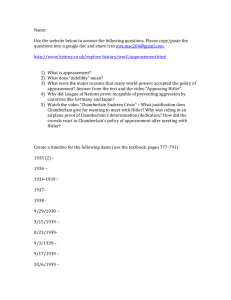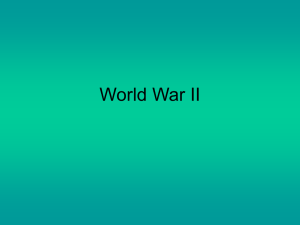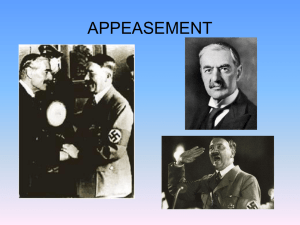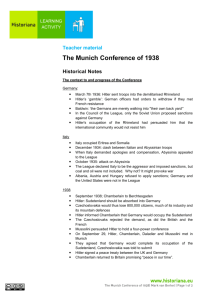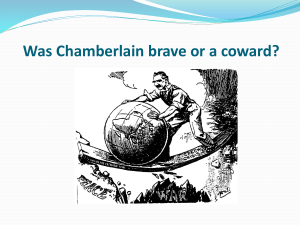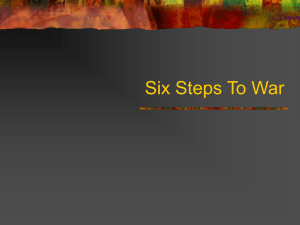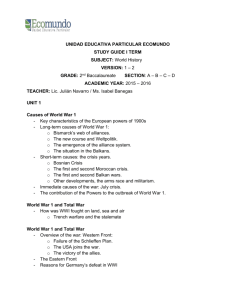Appeasement Lesson Plan_0 - Stanford History Education Group
advertisement
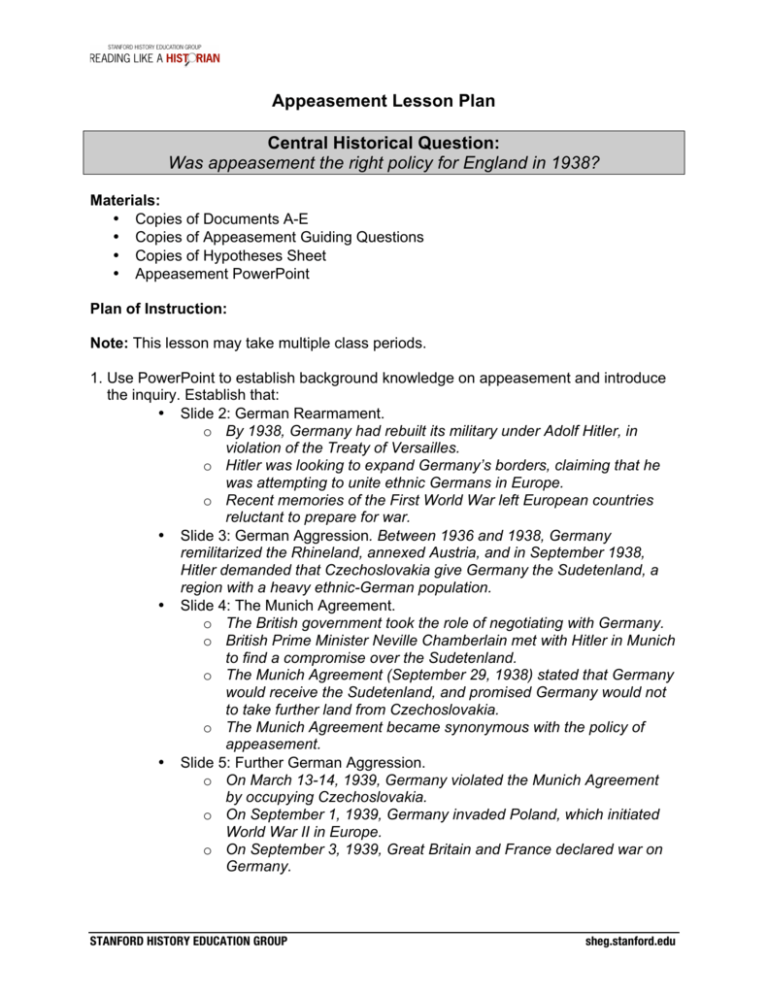
Appeasement Lesson Plan Central Historical Question: Was appeasement the right policy for England in 1938? Materials: • Copies of Documents A-E • Copies of Appeasement Guiding Questions • Copies of Hypotheses Sheet • Appeasement PowerPoint Plan of Instruction: Note: This lesson may take multiple class periods. 1. Use PowerPoint to establish background knowledge on appeasement and introduce the inquiry. Establish that: • Slide 2: German Rearmament. o By 1938, Germany had rebuilt its military under Adolf Hitler, in violation of the Treaty of Versailles. o Hitler was looking to expand Germany’s borders, claiming that he was attempting to unite ethnic Germans in Europe. o Recent memories of the First World War left European countries reluctant to prepare for war. • Slide 3: German Aggression. Between 1936 and 1938, Germany remilitarized the Rhineland, annexed Austria, and in September 1938, Hitler demanded that Czechoslovakia give Germany the Sudetenland, a region with a heavy ethnic-German population. • Slide 4: The Munich Agreement. o The British government took the role of negotiating with Germany. o British Prime Minister Neville Chamberlain met with Hitler in Munich to find a compromise over the Sudetenland. o The Munich Agreement (September 29, 1938) stated that Germany would receive the Sudetenland, and promised Germany would not to take further land from Czechoslovakia. o The Munich Agreement became synonymous with the policy of appeasement. • Slide 5: Further German Aggression. o On March 13-14, 1939, Germany violated the Munich Agreement by occupying Czechoslovakia. o On September 1, 1939, Germany invaded Poland, which initiated World War II in Europe. o On September 3, 1939, Great Britain and France declared war on Germany. STANFORD HISTORY EDUCATION GROUP sheg.stanford.edu • Slide 6: Central Historical Question. Chamberlain’s policy of appeasement was controversial at the time and has been debated by historians and policymakers ever since the Munich Agreement. Our job today is to examine a variety of documents and evaluate different perspectives on appeasement. You will develop a claim, using evidence, to answer the question: Was appeasement the right policy for England in 1938? 2. Round 1: Hand out Documents A and B, Guiding Questions, and Hypotheses Sheet. • Students review Guiding Questions and read excerpts individually. • Students discuss and answer Guiding Questions with partner. • Individually, students develop Hypothesis #1, drawing from Documents A and B. • Share out hypotheses. 3. Round 2: Hand out Documents C, D, and E. • Students review Guiding Questions and read excerpts individually. • Students discuss and answer guiding questions with partner. • Individually, students develop Hypothesis #2, drawing from Documents C, D, and E. • Share out hypotheses. 4. Discussion: • • • • Whose hypotheses changed from Round 1 to Round 2? How and why? Which documents did you find the most persuasive? Why? Which documents contained the strongest evidence? Which documents needed more evidence to back the authors’ claims? What other documents or types of evidence would you need to explore to further address whether or not appeasement was the right policy for England in 1938? Citations Document A "Neville Chamberlain to the House of Commons, October 5, 1938," Parliamentary Debates, 5th series, vol.339 (1938). Retrieved from https://www.mtholyoke.edu/acad/intrel/munich.htm Document B "Winston Churchill to the House of Commons, October 5, 1938," Parliamentary Debates, 5th series, vo.339 (1938). Retrieved from https://www.mtholyoke.edu/acad/intrel/munich.htm Document C Vernon Bartlett, And Now, Tomorrow (1960). Excerpt retrieved from http://www.spartacus.schoolnet.co.uk/2WWappeasement.htm. STANFORD HISTORY EDUCATION GROUP sheg.stanford.edu Document D Henry (Chips) Channon, diary entry (March 15, 1939). Retrieved from http://www.spartacus.schoolnet.co.uk/2WWappeasement.htm Document E The Earl of Halifax, The Fulness of Days, 1957. Retrieved from http://www.spartacus.schoolnet.co.uk/2WWhalifaxL.htm STANFORD HISTORY EDUCATION GROUP sheg.stanford.edu Appeasement Timeline March 13, 1938 Germany annexes Austria. Sept. 22-24, 1938 Chamberlain meets with Hitler in Godesberg, Germany. Hitler claims Sudetenland region of Czechoslovakia would be final German demand for territory. Sept. 29, 1938 Germany, Italy, Great Britain, and France sign the Munich Agreement. March 14-15, 1939 Germany breaks the Munich Agreement and occupies the rest of Czech lands. March 31, 1939 France and Great Britain agree to support Poland against Nazi aggression. Aug. 23, 1939 Germany and the Soviet Union sign the Nazi-Soviet Pact, dividing Eastern Europe into spheres of influence. Sept. 1, 1939 Germany invades Poland. Sept. 3, 1939 Honoring their support of Poland, Great Britain and France declare war on Germany. STANFORD HISTORY EDUCATION GROUP sheg.stanford.edu Document A: Neville Chamberlain (Modified) Neville Chamberlain met with Adolf Hitler twice in 1938 to discuss Germany’s aggressive foreign policy. On September 30, 1938, they signed the Munich Pact, which gave the Sudetenland of Czechoslovakia to Germany. In exchange, Hitler agreed that Germany would not seek to acquire additional territory. In this excerpt, Chamberlain defends the agreement in front of the United Kingdom’s House of Commons. What is the alternative to this bleak and barren policy of the inevitability of war? In my view it is that we should seek by all means in our power to avoid war, by analyzing possible causes, by trying to remove them, by discussion in a spirit of collaboration and good will. I cannot believe that such a program would be rejected by the people of this country, even if it does mean the establishment of personal contact with dictators. . . . I do indeed believe that we may yet secure peace for our time, but I never meant to suggest that we should do that by disarmament, until we can induce others to disarm too. Our past experience has shown us only too clearly that weakness in armed strength means weakness in diplomacy, and if we want to secure a lasting peace, I realize that diplomacy cannot be effective unless . . . behind the diplomacy is the strength to give effect. . . . I cannot help feeling that if, after all, war had come upon us, the people of this Country would have lost their spiritual faith altogether. As it turned out the other way, I think we have all seen something like a new spiritual revival, and I know that everywhere there is a strong desire among the people to record their readiness to serve their Country, where-ever or however their services could be most useful. Source: Neville Chamberlain to the House of Commons, October 5, 1938. Vocabulary induce: convince STANFORD HISTORY EDUCATION GROUP sheg.stanford.edu Document B: Winston Churchill (Modified) Winston Churchill was the loudest and most important critic of Chamberlain’s policy of appeasement. He believed that Hitler and Germany needed to be dealt with more firmly. The following excerpt is from part of a speech Churchill made to the House of Commons as they debated the Munich Agreement. I will begin by saying what everybody would like to ignore or forget but which must nevertheless be stated, namely, that we have sustained a total . . . defeat. . . .The utmost he [Chamberlain] has been able to gain for Czechoslovakia and in the matters which were in dispute has been that the German dictator, instead of snatching his victuals from the table, has been content to have them served to him course by course. . . . I have always held the view that the maintenance of peace depends upon the accumulation of deterrents against the aggressor, coupled with a sincere effort to redress grievances. . . . After the [German] seizure of Austria in March . . . I ventured to . . . pledge that in conjunction with France and other powers they would guarantee the security of Czechoslovakia while the Sudeten-Deutsch question was being examined either by a League of Nations Commission or some other impartial body, and I still believe that if that course had been followed events would not have fallen into this disastrous state. . . . I venture to think that in the future the Czechoslovak State cannot be maintained as an independent entity. You will find that in a period of time, which may not be measured by years, but may be measured only by months, Czechoslovakia will be engulfed in the Nazi regime. . . . We are in the presence of a disaster of the first magnitude which has befallen Great Britain and France. . . . This is only the beginning of the reckoning. Source: Winston Churchill to the House of Commons, October 5, 1938. Vocabulary victuals: food deterrents: prevention strategies STANFORD HISTORY EDUCATION GROUP redress: to make right impartial: fair and just engulfed: consumed sheg.stanford.edu Document C: Bartlett (Modified) Vernon Bartlett was an outspoken critic of the Munich Agreement. He was elected to Parliament in 1938, in part, because of his opposition to appeasement. He was in Godesberg, Germany, working as a reporter when Chamberlain and Hitler met on September 22, 1938. He wrote about the meeting in his book And Now, Tomorrow (1960). The following is an excerpt from the book. The mood of the German officials when it was announced that the Prime Minister (Chamberlain) would not see the Chancellor (Hitler) again was one almost of panic. This meant either war or a Hitler surrender. The crowds that applauded Chamberlain as he drove along the Rhine consisted not so much of ardent nationalists, delighted that a foreign statesman had come to make obeisance to their Fuehrer, as of ordinary human beings who wanted to be kept out of war. Since history cannot - thank God - repeat itself, one cannot produce proof to support one's opinions, but I am firmly convinced that, had Chamberlain stood firm at Godesberg, Hitler would either have climbed down or would have begun war with far less support from his own people than he had a year later. The British forces, one is told, were scandalously unprepared, and were able to make good some of their defects (become better prepared) during that year. But meanwhile the Western Allies lost the Czechoslovak Army one of the best on the Continent - defending a country (Czechoslovakia) from which the German armies could be out-flanked. Source: Vernon Bartlett, And Now, Tomorrow, 1960. Vocabulary obeisance: respect scandalously: worthy of public outrage out-flanked: out-maneuver an enemy STANFORD HISTORY EDUCATION GROUP sheg.stanford.edu Document D: Henry Channon (Modified) Henry Channon was born in America but became a member of Parliament in Britain in 1935. Throughout his life, he kept a detailed diary. The entry below is from the day that Hitler invaded Czechoslovakia, March 15, 1939. Hitler has entered Prague, apparently, and Czechoslovakia has ceased to exist. No balder, bolder departure from the written bond has ever been committed in history. The manner of it surpassed comprehension, and his callous desertion of the Prime Minister is stupefying…The PM must be discouraged and horrified…I thought he looked miserable. His whole policy of appeasement is in ruins. Munich is a torn-up episode. Yet never has he been proved more abundantly right for he gave us six months of peace in which we re-armed, and he was right to try appeasement. Source: Henry Channon, diary entry, March 15, 1939. Document E: Lord Halifax (Modified) Lord Halifax was the British Foreign Secretary from 1938 –1940 and was a key figure in supporting the policy of appeasement. In 1957 he wrote his memoirs, which included long sections devoted to defending the policy of appeasement. The following excerpt comes from his memoirs, Fulness of Days, and attempts to give one reason why appeasement was a good policy. When all has been said, one fact remains dominant and unchallengeable. When war did come a year later [in 1939] it found a country and Commonwealth (the United Kingdom) wholly united within itself, convinced to the foundations of soul and conscience that every conceivable effort had been made to find the way of sparing Europe the ordeal of war, and that no alternative remained. And that was the best thing that Chamberlain did. Source: The Earl of Halifax, The Fulness of Days, 1957. STANFORD HISTORY EDUCATION GROUP sheg.stanford.edu Appeasement: Guiding Questions Document A: Chamberlain 1) (Sourcing) When and where did this speech take place? What was Chamberlain’s goal for the Munich Agreement? 2) (Context) Why might people in England in 1938 have supported appeasement? 3) (Close reading) What did Chamberlain claim England should do while pursuing the policy of appeasement? Document B: Churchill 1) (Sourcing) When and where did this speech take place? What was Churchill’s purpose? 2) (Close reading) What did Churchill mean when he said that instead of being forced to “snatch” his “victuals from the table,” Hitler had “them served to him course by course”? 3) (Context) In the second paragraph, what did Churchill claim could have prevented Germany from taking the Sudetenland? Did he offer any evidence for this claim? 4) (Context) What did Churchill predict will happen in Czechoslovakia? STANFORD HISTORY EDUCATION GROUP sheg.stanford.edu Document C: Bartlett 1) (Sourcing) When was this document written? What was Bartlett’s purpose in writing it? 2) (Close reading) What did Bartlett claim Hitler would have done if Chamberlain had “stood firm” and not pursued appeasement? What, if any, evidence did Bartlett offer to support this claim? 3) (Context) What point did Bartlett make about the British and Czechoslovakian armies? Document D: Channon 1) (Sourcing/Context) When was this document written? What had just happened? 2) (Context) Why did Channon claim appeasement was the right policy? What, if any, evidence did he use to back this claim? Document E: Lord Halifax 1) (Source) When was this document written? What was Halifax’s purpose for writing it? 2) (Context) Why did Halifax claim appeasement was the right policy? What, if any, evidence did he use to back this claim? STANFORD HISTORY EDUCATION GROUP sheg.stanford.edu Appeasement Hypotheses Hypothesis #1: After reading Documents A and B, create a hypothesis to answer the question: Was appeasement the right policy for England in 1938? Cite evidence from the documents to support your answer. Hypothesis #2: After reading Documents C, D, and E, create a hypothesis regarding the question: Was appeasement the right policy for England in 1938? Cite evidence from the documents to support your answer. STANFORD HISTORY EDUCATION GROUP sheg.stanford.edu
